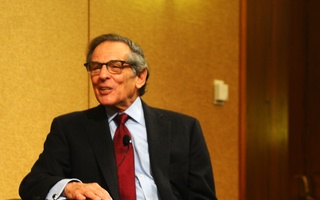After the near-universal critical acclaim accorded to her debut film “Whale Rider” in 2003, director Niki Caro follows up on her breakout success with “North Country.” She looks slightly embarrassed when I address her as “Ms. Caro” and asks me to call her Niki. Caro sits down with The Crimson to talk about her life, her film, and her duty to tell the stories of great women.
The Harvard Crimson: In your previous film, “Whale Rider,” you focused on a young girl who had to prove herself and in your latest film “North Country” you tell the story of a single woman standing up to a coal mine corporation. Why are you so drawn to these types of films?
Niki Caro: I think I’m drawn to them because they’re sort of unusual stories. At the moment, there is still not a lot of illumination of the female experience in cinema, particularly not in Hollywood films. When I read the script, I was shocked at the events and I was also really impressed that a studio had the balls to get it out there.
THC: Your film seems outwardly similar to films like “A Civil Action” or “Erin Brockovich.” How do you distinguish your film from the variety of courtroom dramas?
NC: How I distinguish this from a great film like “Erin Brockovich” is sex. I feel that the issue of the film was pretty unsexy and the lead character was very sexy. I mean, Julia Roberts in a pushup bra—you take notice, right? But in a film like this—which is essentially about sex and a new way of talking and thinking about sex—it’s easy to take that approach with your female actresses. As stunningly gorgeous as [Charlize Theron] is, it would be really transgressive.
I thought it could provoke some pretty vigorous discussion about just how far or not the female condition in the world has come. It was a braising reminder of sexual inequality in the workplace and it’s good for those of us who live in liberal countries or cities or work in an enlightened work place to be reminded that it’s not like that for everybody. There is still work to do. It’s not a feminist right. It’s a human right to work with dignity.
THC: We see Josie struggle in the film to be both a worker in a mine and a single mother. How do you balance being a mother and a film maker?
NC: It’s not easy. But in my case, I have an amazing, amazing husband who’s an architect. He shut down his practice for a couple of years so that he could be a full-time parent to our baby. It’s amazing what happens when you have a baby. You see and feel more pain than you ever imagined possible and more joy than you ever imagined possible and more love and the world becomes much more complex and interesting. She’s two but she brought incredible insights into my film making and incredible sleep deprivation.
THC: Was directing something you fell into because you loved telling stories, you liked exploring those cultural nooks? Were there other careers you wanted to pursue?
NC: I went to art school and I studied sculpture. I had an epiphany of sorts when I had a little show and everybody came and they drank wine. It was a pleasant evening but I realized that the work wasn’t communicating everything that had gone into the making of it. It wasn’t the most potent form of communication for me. I got a little video camera and I started making really bad short films.
I recognize in making drama and making film a lot of things that I loved came together—writing, and performing and photography and music.
Read more in Arts
Hidden Treasures at FoggRecommended Articles
-
Biographer Caro Devoted to LBJFor author Robert Caro, another man’s power struggle has become half a life’s pursuit. By the time of the publication
-
GLEE CLUB TO SING AT SYMPHONY HALL TONIGHTThe Glee Club will give its second large concert of the season in Symphony Hall this evening. Dusolina Giannini, celebrated
-
Wireless Access Remains SpottyHarvard is cracking down on computer users who are hogging bandwidth and blocking their neighbors from logging online. But the
-
 Nieman Foundation Celebrates 75th Anniversary
Nieman Foundation Celebrates 75th Anniversary -
 Field Hockey to Vie Against Princeton for Share of Ivy Crown
Field Hockey to Vie Against Princeton for Share of Ivy Crown













